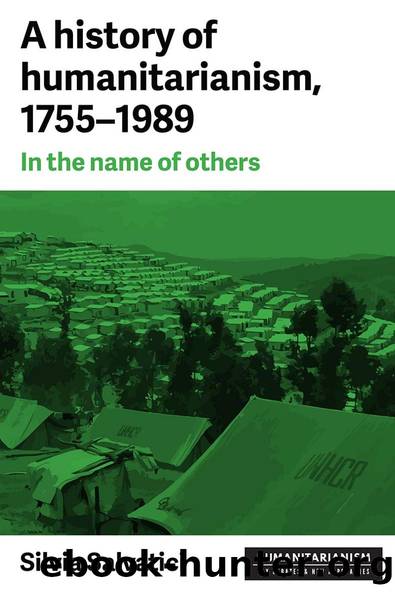A History of Humanitarianism, 1755â1989: In the Name of Others by Silvia Salvatici

Author:Silvia Salvatici [Salvatici, Silvia]
Language: eng
Format: epub
Tags: Political Science, General, Social Science, Disasters & Disaster Relief, History, Modern, International Relations, Business & Economics, Corporate & Business History
ISBN: 9781526120175
Google: CXK5DwAAQBAJ
Publisher: Manchester University Press
Published: 2019-04-27T01:47:00+00:00
Part III
From Europe to the Third World
Sir,
We expatriates, working in Biafra, wish to draw attention to the recent intensification of air attacks on civilians here, despite world pressure for peace talks. Over the past week several hundred Biafran civilians have been killed in this way. At Owerri 43 out of 65 dead were children. Deaths in Aba totaled 118.
In an air raid on Umuahia (April 25), of which we were eye-witnesses, 107 bodies were counted in the hospital mortuary, and 130 casualties were admitted, of whom 18 were children; three of the children died, and others will be crippled or maimed for life. At least six of those killed were expectant mothers.1
The dry statement of the deaths caused by the bombardments on civilians was sent to The Times by a small group of priests who were taking care of the sick and wounded at the hospital in Umuahia, the city where they were present during one of the raids by the Federal Nigerian army against the Biafrans. Although they limited themselves to providing information on what was happening in their immediate area, the Catholic missionaries underlined that civilians had been deliberately struck by the enemy army, whose brutality they reiterated. The English newspaper published their letter in May 1968, when the civil war in Nigeria, better known as the Biafran War, had been in progress for a year, though it had received little consideration by the Western world. Shortly after, though, the tragedy of the Biafrans â killed by Nigerian bombs but above all by hunger â quickly gained the attention of public opinion, placing it at the centre of a vast international mobilisation.
The civil war in Nigeria was âthe first postcolonial conflict to engender a transnational wave of humanitarian concernâ.2 This is also why it is usually identified as a turning point, as the beginning of a new phase in the history of humanitarianism. In this interpretation, the aid sent to the victims of the Nigerian civil war ratified the shift in the humanitarian agenciesâ range of action, orienting it for good towards the non-European regions that were going through the process of decolonisation and the tensions of the Cold War. In addition, the wide coverage of the âmass deathâ in Biafra expressed a new role for the media, which transformed a war largely ignored by the Western world into an event able to âengender a transnational wave of humanitarian concernâ. Finally, the mobilisation for the conflict that had erupted in western Africa allowed the emergence of the new central role on the international scene of the non-governmental organisations, which played a major part in collecting donations and sending aid to the Biafran population.3
The Nigerian civil war was undoubtedly a crucial event that made obvious, fed and accelerated international humanitarianismâs transformation. To understand this process, and therefore the reasons that contributed to making 1967â70 a turning point, we need to examine a longer stretch of time, which runs from the early 1950s to the end of the Cold War.
The
Download
This site does not store any files on its server. We only index and link to content provided by other sites. Please contact the content providers to delete copyright contents if any and email us, we'll remove relevant links or contents immediately.
Cecilia; Or, Memoirs of an Heiress — Volume 1 by Fanny Burney(32548)
Cecilia; Or, Memoirs of an Heiress — Volume 2 by Fanny Burney(31947)
Cecilia; Or, Memoirs of an Heiress — Volume 3 by Fanny Burney(31932)
The Great Music City by Andrea Baker(31917)
We're Going to Need More Wine by Gabrielle Union(19034)
All the Missing Girls by Megan Miranda(15960)
Pimp by Iceberg Slim(14488)
Bombshells: Glamour Girls of a Lifetime by Sullivan Steve(14058)
For the Love of Europe by Rick Steves(13932)
Talking to Strangers by Malcolm Gladwell(13350)
Norse Mythology by Gaiman Neil(13349)
Fifty Shades Freed by E L James(13233)
Mindhunter: Inside the FBI's Elite Serial Crime Unit by John E. Douglas & Mark Olshaker(9324)
Crazy Rich Asians by Kevin Kwan(9280)
The Lost Art of Listening by Michael P. Nichols(7494)
Enlightenment Now: The Case for Reason, Science, Humanism, and Progress by Steven Pinker(7306)
The Four Agreements by Don Miguel Ruiz(6745)
Bad Blood by John Carreyrou(6611)
Weapons of Math Destruction by Cathy O'Neil(6267)
